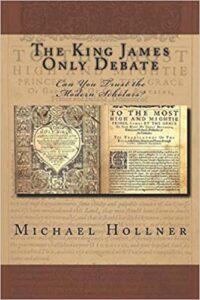 (Read part 1, part 2). Part 3 will cover chapter 15, “The Oxford vs. Cambridge Fallacy.” In the table of contents this is just called “Oxford/Cambridge Fallacy.” Hollner throughout confounds the Cambridge/Oxford differences issue with the King James editions issue. He also continually misuses the word “reprint.” He wrongly applies it to King James Bibles published from 1611-1769. He wrongly claims (in a poorly written sentence) that the Oxford/Cambridge issue “is basically only involving 12 verses of Scripture” (p. 434). Likewise, if the word “spirit” has a lower case s in a King James Bible and then an upper case S in another King James Bible, the second Bible cannot be called a “reprint” of the first (p. 434). He wrongly says that “there has been a few reprints due to printing press errors in spelling, archaic word updates, individual letters, or even one word within a verse” (p. 439). Every other use of the word “reprint” in this chapter is wrong.
(Read part 1, part 2). Part 3 will cover chapter 15, “The Oxford vs. Cambridge Fallacy.” In the table of contents this is just called “Oxford/Cambridge Fallacy.” Hollner throughout confounds the Cambridge/Oxford differences issue with the King James editions issue. He also continually misuses the word “reprint.” He wrongly applies it to King James Bibles published from 1611-1769. He wrongly claims (in a poorly written sentence) that the Oxford/Cambridge issue “is basically only involving 12 verses of Scripture” (p. 434). Likewise, if the word “spirit” has a lower case s in a King James Bible and then an upper case S in another King James Bible, the second Bible cannot be called a “reprint” of the first (p. 434). He wrongly says that “there has been a few reprints due to printing press errors in spelling, archaic word updates, individual letters, or even one word within a verse” (p. 439). Every other use of the word “reprint” in this chapter is wrong.
The Collins King James Bible that the author bought in 1984 is not “a Cambridge edition according to the several insignificant differences” (p. 434). It was and will always be a Collins edition. Hollner misuses and truncates a quote from an 1851 (not 1852) report to the Board of Managers of the American Bible Society (see p. 163 in my book King James, His Bible, and Its Translators). He terms the difference in reading of ye/he in Jeremiah 34:16 in some King James Bibles as an “insignificant textual variation” that is “too small or unimportant to be worth consideration” and “meaningless and not worthy of further discussion” (p. 436). Really? I thought “every word of God is pure” (Pro. 30:5). The list that is supposed to be on page 184 is on page 183 (pgs. 439, 440). It is not true that modern revisions of the Bible “all follow the 1881 corrupted Greek text of Westcott/Hort” (p. 440). And, no surprise, commas and quotation marks are misused in several places. Stay tuned for the fourth installment.